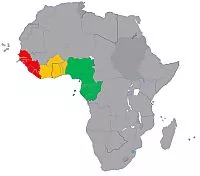In August 2016, reports emerged of a new militant group in the Niger Delta- the Niger Delta Greenland Justice Mandate (NDGJM)- and there were also reports of a split in the latest group to wreak havoc in the oil-producing region, the Niger Delta Avengers (NDA). Militancy appears to be on the rise, having a significant impact on the oil sector and on the government's finances, as Nigeria's crown as the largest economy in Africa yields to that of South Africa's. One report suggests Niger Delta attacks have cost Nigeria's economy as much as US$1 billion this year alone1.
At this juncture of increased insecurity in the Niger Delta, Songhai Advisory's Nigeria-based Analyst, Adedayo Ademuwagun, shares his perspectives on the situation in the Niger Delta following a recent visit to the region with Songhai Managing Partner, Kissy Agyeman-Togobo.
KAT: It seems like a number of militant groups are mushrooming in the Niger Delta of late. Who is the NDA?
AA: The NDA is a faceless group like other militant groups that recently gained some prominence. I spoke with various community leaders and locals in the region and they said these militants, whether NDA or others, are mostly of the Ijaw ethnic group in the region and militancy is most prominent in the areas the Ijaws live in.
KAT: Why does the NDA seem to be splitting now?
AA: It's uncertain if there's been an actual split because the newspaper reports simply relied on a statement from an unknown source which was signed using a pseudonym2. If there really has been a split, it could be because of a fallout within the group. It's been reported that the breakaway group is called the Reformed Niger Delta Avengers which has reportedly renounced the NDA. It said it intends to dialogue with government and stop violence. At the same time though, the NDA says its house is still in order and there's been no split. It's also plausible that an agent acting for the government may have put out the statement of a split to derail the NDA and change the narrative in the media.
KAT: What about groups like Adaka Boro Avengers (ADA) and Niger Delta Greenland Justice Mandate (NDGJM)? Who are they?
AA: Adaka Boro is a late soldier from Bayelsa (an Ijaw state) in the Niger Delta who's considered a hero by locals in the region. This is where the Adaka Boro Avengers got their name from.
NDGJM is a little known group that's made only one attack as of August 12. Unlike others, it seems to be a non-Ijaw group because it has accused the government of making offers to Ijaw militants alone. Its emergence suggests that in future militant groups may develop from non-Ijaw parts of the Delta, wanting their own share of benefits too. For instance, I spoke with two Isoko community leaders in Delta state, and they told me their people scarcely benefited from the government's amnesty program.
One said, "It's not right for the government to give handouts to the Ijaws while others get little or nothing. Perhaps it happened that way because the president (then Goodluck Jonathan) is their kin. Isoko youths have got nothing from the amnesty program. Those Ijaw militants aren't fighting for the Niger Delta. They're fighting for their own pockets."
The Niger Delta Avengers and the Movement for the Emancipation of the Niger Delta (MEND) are from a small area of the region (Bayelsa, parts of Rivers and Delta states) and do not really represent the Niger Delta. They actually include 'Niger Delta' in their name for the sensation.
KAT: Why is the Niger Delta a sensational issue in Nigeria?
AA: Oil bases in Nigeria are in the Niger Delta region, and in the past oil spillages and gas flaring degraded the environment in some host communities. Oil firms and the federal government are persistently blamed for purportedly neglecting to develop the region and safeguard the environment. So militants from the region try to draw sympathy by linking their militancy to these sentiments.
KAT: Whereabouts does this militancy occur?
AA: The militancy occurs mostly in riverine communities of Bayelsa, Rivers and Delta states where the Ijaw communities live. The militants are accustomed to the waters and so they're able to navigate the waterways and attack targets on speedboats.
KAT: What's causing the militancy now?
Actually, militancy occurs constantly in the mentioned areas even when it's not in the news. Oil firms endlessly face the risk of attack on their staff or facilities, and so troops and other forces are often on the ground. The militancy seemed to abate between 2010 and 2015 when Goodluck Jonathan (who is Ijaw) was president, but the media help to create this perception. Throughout that time the media had the Boko Haram insurgency on the front burner and so it paid far less attention to militancy in the Delta. This discouraged major attacks. Militants in the region are emboldened by media coverage. This year for instance, the NDA frantically tweeted at local newspapers every time they struck, and the more the media covered it, the more it emboldened them to strike again.
KAT: What are the groups targeting & what's their motivation?
AA: Like others, the NDA targets key oil facilities in the region with the aim of causing as much damage as possible. But militants in the region sometimes target troops or other officers on guard, as was the case on 8 August when militants on speedboats disguised and opened fire on a group of soldiers in Bayelsa, killing three of them.
The main motivation for these militants is to get the government's attention. This is true in the case of the NDA, and more recently the ADA, which was obscure until it threatened to launch a campaign to secede the Niger Delta from the rest of Nigeria in July 2016, even though it lacked the military power or popular backing to do so. It later backtracked.
When militants attack oil bases and it disrupts output, the government notices because it depends heavily on revenue it gets when the oil firms export what they produce. This has recently resulted in direct benefits to the militants, as in 2009 when the government offered militants a monthly allowance and training if they put down their guns. That program was called the amnesty program, and it's still in effect today.
KAT: How are these groups financed?
AA: It's currently not clear who finances the NDA, ABA. There's lots of conjecture out there though- one theory is that certain Ijaw politicians disgruntled about the ousting of Goodluck Jonathan (also an Ijaw) could be financing militants this year. The amnesty programme- which was meant for the entire region- seemed to favour disproportionately, the Ijaw community but now that it's been halted, it could be fanning the flames for discontent, since the beneficiaries of the programme have now seen their benefits cut off.
KAT: What's the relationship between newly prominent groups like the NDA and formerly active ones like MEND?
AA: The NDA may be militants who used to be with MEND, but their statements indicate that they're familiar with these former groups even if they aren't in agreement with them presently. NDA has repeatedly criticised MEND and associated individuals such as 'Boyloaf' and 'Tompolo', calling them political sidekicks in one statement3.
KAT: What's the effect of these attacks on business in the Niger Delta?
AA: The oil industry aside, the attacks don't seem to have a direct impact on business operations in the region. Business seems to go on normally in the region.
KAT: How has the government responded and how has it been affected?
AA: The disruptions have cut the crude output available for export this year and the government's revenue has taken a hit. Oil Minister Ibe Kachikwu reportedly said production, which was 2.2 million bpd at the start of the year had dropped to 1.9 million bpd as of July4.
At the same time, the government has responded with a carrot-and-stick approach. Troops were initially deployed to suspected communities to flush out the militants. The government tried negotiating peace with local leaders, and then positioned troops again for offensives, should peace talks fail.
Footnotes
1 http://thesheet.ng/attacks-niger-delta-avengers-cost-nigeria-daily-read/
2 http://saharareporters.com/2016/08/06/former-president-jonathan-tompolo-akpabio-wike-dokpesi-others-named-sponsors-niger-delta
3 http://www.nigerdeltaavengers.org/2016/06/mend-your-criminal-days-are-over.html?m=1
4 http://www.reuters.com/article/idUSKCN0ZO0RV
The content of this article is intended to provide a general guide to the subject matter. Specialist advice should be sought about your specific circumstances.



